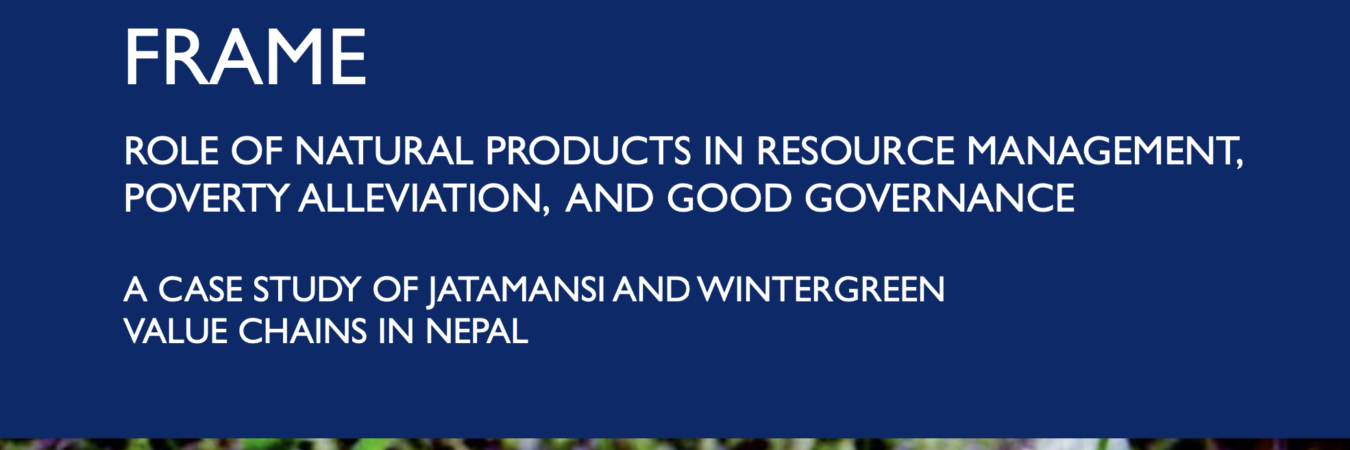
Report And Case Studies
Role of natural products in resource management, poverty alleviation and good governance – A case study of Jatamansi and Wintergreen value chains in Nepal
Author: Mr. Binod Pokharel, Mr. Madhusudan Subedi, Mr. Indu Bikal Sapkota, Dr. Bhishma Subedi, The Asia Network for Sustainable Agriculture and Bioresources (ANSAB), and Enterprise Works/VITA for International Resources Group (IRG)
Publisher: USAID
Language: English
Date of Publication: March 2006
ISBN: N/A
Number of Pages: 39
Price: Free
Close to 40,000 people derive economic benefits from essential oils harvesting, trade and processing in Nepal.
Essential oils are a subset of the natural products sector, also know as nontimber forest products in Nepal, which generated over Rs. 2.5 billion (about US $34.2 million) in trade for Nepal in 2004. Over the last decade the Nepal natural products sector has undergone significant changes with the increase in community forest user rights and increased local processing. This has given Nepal an opportunity to expand beyond its dependence on Indian markets, but also highlighted how much more work Nepal needs to become competitive in world markets for natural products while sustainably managing the unique biodiversity of the natural products harvesting areas.
The FRAME sponsored study, a program of USAID, surveyed actors throughout the Jatamansi and Wintergreen value chains, in representative production, trade and processing areas of Nepal. Jatamansi and Wintergreen are aromatic natural products that are processed into essential oils for perfumes, personal care, and medicines.
The study mapped the nature, wealth and power dynamics of the essential oils sector in Nepal using Jatamansi and Wintergreen as example products within the product class of essential oils and the larger sector of natural products. Jatamansi and Wintergreen provided a contrast in export and domestically consumed natural products and demonstrated that there is potential for essential oils in both markets.
Raw Jatamansi and oil are an export product for Nepal. The value chain dynamics have changed significantly in the last decade from over 90% traded illegally in raw form to India, to 75% now processed into essential oil in Nepal. Wintergreen has 100% processing in Nepal with 90% of the oil sold on the domestic market.
Study results were presented to a cross section of the non-timber forest product (NTFP) actors at a workshop in Kathmandu in December 2005 and the following were the top recommendations to improve the sector’s performance.
- The Community Forest User Group (CFUG) program has been instrumental in improving resource management, instituting sustainable harvesting, and organizing harvesting communities to gain more benefits within the Wintergreen and Jatamansi value chains, but only where assisted by NGOs. There are still many CFUGs that lack effective operational plans and more needs to be done to assist CFUGs to understand the value chains for natural products.
- Processing close to the harvesting areas would reduce high transport, storage, and multiple trade expenses that increase the cost structure for Jatamansi and limit the amount of Wintergreen harvested (since Wintergreen has to be processed quickly after harvesting).
- Nepal has a unique selling position it can exploit in overseas markets with sustainable, fair trade and organic markets. Forest stewardship and organic certifications are in place for some products and areas and now uniform quality control and consolidation of supply from various locations is needed. Nepal also needs to invest in quality control (proper storage, testing facilities, and uniform documentation) to be able to compete in world markets and break its dependence on India as its primary export market.
- Improved coordination among Nepali regulatory bodies, reducing overlapping jurisdiction among Nepali agencies with regards to NTFP promotion, harvesting, and processing, as well as more reasonable tax rates would reduce transactions costs within the value chains, promote more enterprise start-ups and help to make Nepali essential oils more competitive in world markets.
